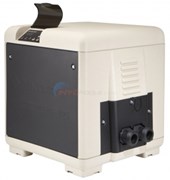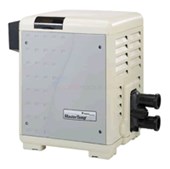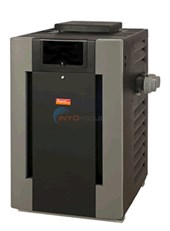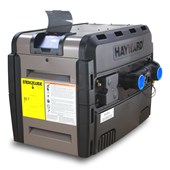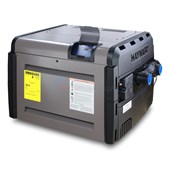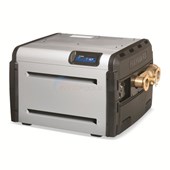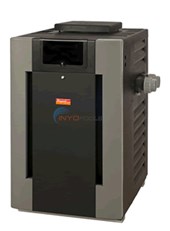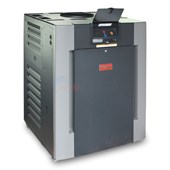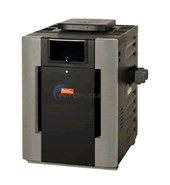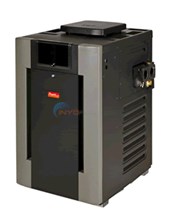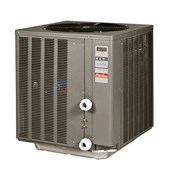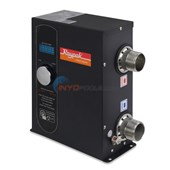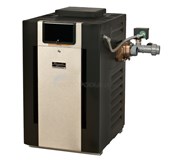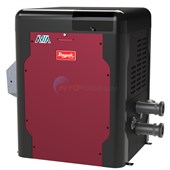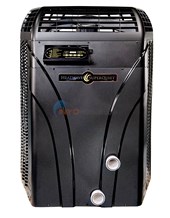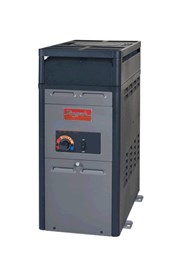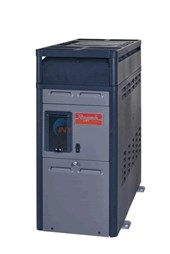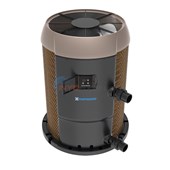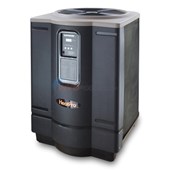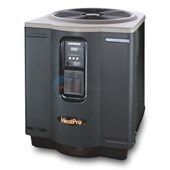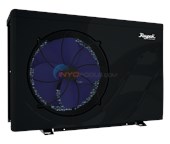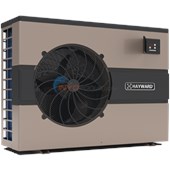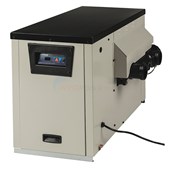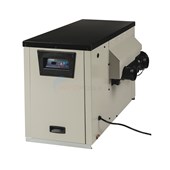Pool Heaters and Heat Pumps
Part # EC-462024
$1929.00
IN STOCK
BTU
125,000 BTU
Heat Exchanger
Copper
Type
Low NOx
Ignition
Electronic
Manufacturer
Pentair
Heater Type
Natural Gas
BTU
125,000 BTU
Heat Exchanger
Copper
Type
Low NOx
Ignition
Electronic
Manufacturer
Pentair
Heater Type
Natural Gas
Pentair MasterTemp Heater, 250,000 BTU, Natural Gas, Low NOx, Copper Heat Exchanger - EC-462026
Part # EC-462026
$3509.00
IN STOCK
BTU
250,000 BTU
Heat Exchanger
Copper
Type
Low NOx
Ignition
Electronic
Manufacturer
Pentair
Heater Type
Natural Gas
BTU
250,000 BTU
Heat Exchanger
Copper
Type
Low NOx
Ignition
Electronic
Manufacturer
Pentair
Heater Type
Natural Gas
Pentair MasterTemp Heater, 400,000 BTU, Natural Gas, Low NOx, Copper Heat Exchanger - EC-462028
Part # EC-462028
$4499.00
IN STOCK
BTU
400,000 BTU
Heat Exchanger
Copper
Type
Low NOx
Ignition
Electronic
Manufacturer
Pentair
Heater Type
Natural Gas
BTU
400,000 BTU
Heat Exchanger
Copper
Type
Low NOx
Ignition
Electronic
Manufacturer
Pentair
Heater Type
Natural Gas
Raypak RP2100 Digital Natural Gas Heater, 199,500 BTU, Cupro-Nickel Heat Exchanger - P-R206A-EN-X #51
Part # P-R206A-EN-X #51
$3249.00
IN STOCK
BTU
206,000 BTU
Heat Exchanger
Cupro-Nickel
Ignition
Electronic
Manufacturer
Raypak
Heater Type
Natural Gas
BTU
206,000 BTU
Heat Exchanger
Cupro-Nickel
Ignition
Electronic
Manufacturer
Raypak
Heater Type
Natural Gas
Raypak RP2100 Digital Natural Gas Heater, 266,000 BTU, Cupro-Nickel Heat Exchanger - P-R266A-EN-X #51
Part # P-R266A-EN-X #51
$3529.00
IN STOCK
BTU
266,000 BTU
Heat Exchanger
Cupro-Nickel
Ignition
Electronic
Manufacturer
Raypak
Heater Type
Natural Gas
BTU
266,000 BTU
Heat Exchanger
Cupro-Nickel
Ignition
Electronic
Manufacturer
Raypak
Heater Type
Natural Gas
Raypak RP2100 Digital Natural Gas Heater, 332,500 BTU, Cupro-Nickel Heat Exchanger - P-R336A-EN-X #51
Part # P-R366A-EN-X #51
$3969.00
IN STOCK
BTU
336,000 BTU
Heat Exchanger
Cupro-Nickel
Ignition
Electronic
Manufacturer
Raypak
Heater Type
Natural Gas
BTU
336,000 BTU
Heat Exchanger
Cupro-Nickel
Ignition
Electronic
Manufacturer
Raypak
Heater Type
Natural Gas
Raypak RP2100 Digital Natural Gas Heater, 399,000 BTU, Cupro-Nickel Heat Exchanger - P-R406A-EN-X #51
Part # P-R406A-EN-X #51
$4479.00
IN STOCK
BTU
406,000 BTU
Heat Exchanger
Cupro-Nickel
Ignition
Electronic
Manufacturer
Raypak
Heater Type
Natural Gas
BTU
406,000 BTU
Heat Exchanger
Cupro-Nickel
Ignition
Electronic
Manufacturer
Raypak
Heater Type
Natural Gas
Hayward Universal H-Series Heater, Low NOx, 150,000 BTU, Natural Gas, Cupro-Nickel Heat Exchanger - W3H150FDN
Part # W3H150FDN
$2599.00
IN STOCK
BTU
150,000 BTU
Heat Exchanger
Cupro-Nickel
Type
Low NOx
Ignition
Electronic
Manufacturer
Hayward
Heater Type
Natural Gas
BTU
150,000 BTU
Heat Exchanger
Cupro-Nickel
Type
Low NOx
Ignition
Electronic
Manufacturer
Hayward
Heater Type
Natural Gas
Hayward Universal H-Series Heater, Low NOx, 200,000 BTU, Natural Gas, Cupro-Nickel Heat Exchanger - W3H200FDN
Part # W3H200FDN
$3199.00
IN STOCK
BTU
200,000 BTU
Heat Exchanger
Cupro-Nickel
Type
Low NOx
Ignition
Electronic
Manufacturer
Hayward
Heater Type
Natural Gas
BTU
200,000 BTU
Heat Exchanger
Cupro-Nickel
Type
Low NOx
Ignition
Electronic
Manufacturer
Hayward
Heater Type
Natural Gas
Hayward Universal H-Series Heater, Low NOx, 250,000 BTU, Natural Gas, Cupro-Nickel Heat Exchanger - W3H250FDN
Part # W3H250FDN
$3499.00
IN STOCK
BTU
250,000 BTU
Heat Exchanger
Cupro-Nickel
Type
Low NOx
Ignition
Electronic
Manufacturer
Hayward
Heater Type
Natural Gas
BTU
250,000 BTU
Heat Exchanger
Cupro-Nickel
Type
Low NOx
Ignition
Electronic
Manufacturer
Hayward
Heater Type
Natural Gas
Hayward Universal H-Series Heater, Low NOx, 400,000 BTU, Natural Gas, Cupro-Nickel Heat Exchanger - W3H400FDN
Part # W3H400FDN
$4499.00
IN STOCK
BTU
400,000 BTU
Heat Exchanger
Cupro-Nickel
Type
Low NOx
Ignition
Electronic
Manufacturer
Hayward
Heater Type
Natural Gas
BTU
400,000 BTU
Heat Exchanger
Cupro-Nickel
Type
Low NOx
Ignition
Electronic
Manufacturer
Hayward
Heater Type
Natural Gas
Universal H-Series Low NOx Heater 250K BTU - NG ASME
Part # H250FDNASME
$4399.00
IN STOCK
BTU
250,000 BTU
Heat Exchanger
Cupro-Nickel
Type
Low NOx
Ignition
Electronic
Certification
ASME
Manufacturer
Hayward
Heater Type
Natural Gas
BTU
250,000 BTU
Heat Exchanger
Cupro-Nickel
Type
Low NOx
Ignition
Electronic
Certification
ASME
Manufacturer
Hayward
Heater Type
Natural Gas
Universal H-Series Low NOx Heater 400K BTU - NG ASME
Part # H400FDNASME
$5074.25
IN STOCK
BTU
400,000 BTU
Heat Exchanger
Cupro-Nickel
Type
Low NOx
Ignition
Electronic
Certification
ASME
Manufacturer
Hayward
Heater Type
Natural Gas
BTU
400,000 BTU
Heat Exchanger
Cupro-Nickel
Type
Low NOx
Ignition
Electronic
Certification
ASME
Manufacturer
Hayward
Heater Type
Natural Gas
Universal H-Series Low NOx Heater 500K BTU - NG ASME
Part # H500FDNASME
$6299.00
IN STOCK
BTU
500,000 BTU
Heat Exchanger
Cupro-Nickel
Type
Low NOx
Ignition
Electronic
Certification
ASME
Manufacturer
Hayward
Heater Type
Natural Gas
BTU
500,000 BTU
Heat Exchanger
Cupro-Nickel
Type
Low NOx
Ignition
Electronic
Certification
ASME
Manufacturer
Hayward
Heater Type
Natural Gas
RP2100 Digital Heater - R266A - 2,000'-6000' - Copper - Natural Gas
Part # P-R266A-EN-C #51
$3249.00
IN STOCK
BTU
266,000 BTU
Heat Exchanger
Copper
Ignition
Electronic
Manufacturer
Raypak
Heater Type
Natural Gas
BTU
266,000 BTU
Heat Exchanger
Copper
Ignition
Electronic
Manufacturer
Raypak
Heater Type
Natural Gas
Raypak RP2100 Digital Natural Gas Heater, 399,000 BTU, High Altitude, Copper Heat Exchanger - P-R406A-EN-C #51
Part # P-R406A-EN-C #51
$3963.00
IN STOCK
BTU
406,000 BTU
Heat Exchanger
Copper
Ignition
Electronic
Manufacturer
Raypak
Heater Type
Natural Gas
BTU
406,000 BTU
Heat Exchanger
Copper
Ignition
Electronic
Manufacturer
Raypak
Heater Type
Natural Gas
Raypak RP2100 Digital Natural Gas Heater, 199,500 BTU, Copper Heat Exchanger - P-R206A-EN-C #50
Part # P-R206A-EN-C #50
$2999.00
IN STOCK
BTU
206,000 BTU
Heat Exchanger
Copper
Ignition
Electronic
Manufacturer
Raypak
Heater Type
Natural Gas
BTU
206,000 BTU
Heat Exchanger
Copper
Ignition
Electronic
Manufacturer
Raypak
Heater Type
Natural Gas
Raypak RP2100 Digital Natual Gas Heater, 266,000 BTU, Copper Heat Exchanger - P-R266A-EN-C #50
Part # P-R266A-EN-C #50
$3249.00
IN STOCK
BTU
266,000 BTU
Heat Exchanger
Copper
Ignition
Electronic
Manufacturer
Raypak
Heater Type
Natural Gas
BTU
266,000 BTU
Heat Exchanger
Copper
Ignition
Electronic
Manufacturer
Raypak
Heater Type
Natural Gas
Raypak RP2100 Millivolt Natural Gas Heater, 332,500 BTU, Copper Heat Exchanger - P-R336A-MN-C #50
Part # P-R336A-MN-C #50
$3932.00
IN STOCK
BTU
336,000 BTU
Heat Exchanger
Copper
Ignition
Milivolt
Manufacturer
Raypak
Heater Type
Natural Gas
BTU
336,000 BTU
Heat Exchanger
Copper
Ignition
Milivolt
Manufacturer
Raypak
Heater Type
Natural Gas
Raypak RP2100 Digital Natural Gas Heater, 336,000 BTU, Copper Heat Exchanger - P-R336A-EN-C #50
Part # P-R336A-EN-C #50
$3659.00
IN STOCK
BTU
336,000 BTU
Heat Exchanger
Copper
Ignition
Electronic
Manufacturer
Raypak
Heater Type
Natural Gas
BTU
336,000 BTU
Heat Exchanger
Copper
Ignition
Electronic
Manufacturer
Raypak
Heater Type
Natural Gas
Raypak RP2100 Digital Natural Gas Heater, 399,000 BTU, Copper Heat Exchanger - P-R406A-EN-C #50
Part # P-R406A-EN-C #50
$4129.00
IN STOCK
BTU
406,000 BTU
Heat Exchanger
Copper
Ignition
Electronic
Manufacturer
Raypak
Heater Type
Natural Gas
BTU
406,000 BTU
Heat Exchanger
Copper
Ignition
Electronic
Manufacturer
Raypak
Heater Type
Natural Gas
RP2100 Millivolt Heater - R266A - 6,000'-9000' - Copper - Natural Gas
Part # P-R266A-MN-C #52
$3595.20
IN STOCK
BTU
266,000 BTU
Heat Exchanger
Copper
Ignition
Milivolt
Manufacturer
Raypak
Heater Type
Natural Gas
BTU
266,000 BTU
Heat Exchanger
Copper
Ignition
Milivolt
Manufacturer
Raypak
Heater Type
Natural Gas
Raypak RP2100 Digital Natural Gas Heater, 266,000 BTU, Cupro-Nickel Exchanger - P-R266A-EN-X #51
Part # P-R266A-EN-X #51
$3427.00
IN STOCK
BTU
266,000 BTU
Heat Exchanger
Cupro-Nickel
Ignition
Electronic
Manufacturer
Raypak
Heater Type
Natural Gas
BTU
266,000 BTU
Heat Exchanger
Cupro-Nickel
Ignition
Electronic
Manufacturer
Raypak
Heater Type
Natural Gas
Raypak Heater 266BTU Natural Gas ELE ASME Replaced by 017372 Raypak BR266AENC
Part # 009269
$3849.00
IN STOCK
BTU
266,000 BTU
Heat Exchanger
Copper
Ignition
Electronic
Certification
ASME
Manufacturer
Raypak
Heater Type
Natural Gas
BTU
266,000 BTU
Heat Exchanger
Copper
Ignition
Electronic
Certification
ASME
Manufacturer
Raypak
Heater Type
Natural Gas
Raypak ASME Digital Natural Gas Heater, 399,000 BTU, Copper Heat Exchanger - 009271
Part # 009271
$4969.00
IN STOCK
BTU
406,000 BTU
Heat Exchanger
Copper
Ignition
Electronic
Certification
ASME
Manufacturer
Raypak
Heater Type
Natural Gas
BTU
406,000 BTU
Heat Exchanger
Copper
Ignition
Electronic
Certification
ASME
Manufacturer
Raypak
Heater Type
Natural Gas
Raypak Digital ASME Propane Gas Heater, 399K BTU, #57, Cupro-Nickel Exchanger Bronze Headers, ProTek Shield Module
Part # B-R406A-EP-X
$5279.00
IN STOCK
BTU
406,000 BTU
Heat Exchanger
Cupro-Nickel
Ignition
Electronic
Certification
ASME
Manufacturer
Raypak
Heater Type
Propane
BTU
406,000 BTU
Heat Exchanger
Cupro-Nickel
Ignition
Electronic
Certification
ASME
Manufacturer
Raypak
Heater Type
Propane
Raypak Compact Series Heat Pump, 62,000 BTU, Titanium Heat Exchanger - Model R3450TI-E
Part # 016635
$3449.00
IN STOCK
BTU
62,000 BTU
Heat Exchanger
Titanium
Manufacturer
Raypak
Heater Type
Heat Pump
BTU
62,000 BTU
Heat Exchanger
Titanium
Manufacturer
Raypak
Heater Type
Heat Pump
Raypak Crosswind V Heat Pump, 138K BTU, Model 8550, Wi-Fi/App Enabled - TWPH8550EHT08
Part # TWPH8550EHT08
$4844.00
IN STOCK
BTU
138,000 BTU
Heat Exchanger
Titanium
Manufacturer
Raypak
Special Feature
Wifi-Enabled
Heater Type
Heat Pump
BTU
138,000 BTU
Heat Exchanger
Titanium
Manufacturer
Raypak
Special Feature
Wifi-Enabled
Heater Type
Heat Pump
Hayward Universal H-Series Heater, Low NOx, 150,000 BTU, Propane, Cupro-Nickel Heat Exchanger - W3H150FDP
Part # W3H150FDP
$2599.00
IN STOCK
BTU
150,000 BTU
Heat Exchanger
Cupro-Nickel
Type
Low NOx
Ignition
Electronic
Manufacturer
Hayward
Heater Type
Propane
BTU
150,000 BTU
Heat Exchanger
Cupro-Nickel
Type
Low NOx
Ignition
Electronic
Manufacturer
Hayward
Heater Type
Propane
Hayward Universal H-Series Heater, Low NOx, 200,000 BTU, Propane, Cupro-Nickel Heat Exchanger - W3H200FDP
Part # W3H200FDP
$3199.00
IN STOCK
BTU
200,000 BTU
Heat Exchanger
Cupro-Nickel
Type
Low NOx
Ignition
Electronic
Manufacturer
Hayward
Heater Type
Propane
BTU
200,000 BTU
Heat Exchanger
Cupro-Nickel
Type
Low NOx
Ignition
Electronic
Manufacturer
Hayward
Heater Type
Propane
Hayward Universal H-Series Heater, Low NOx, 250,000 BTU, Propane, Cupro-Nickel Heat Exchanger - W3H250FDP
Part # W3H250FDP
$3499.00
IN STOCK
BTU
250,000 BTU
Heat Exchanger
Cupro-Nickel
Type
Low NOx
Ignition
Electronic
Manufacturer
Hayward
Heater Type
Propane
BTU
250,000 BTU
Heat Exchanger
Cupro-Nickel
Type
Low NOx
Ignition
Electronic
Manufacturer
Hayward
Heater Type
Propane
Hayward Universal H-Series Heater, Low NOx, 400,000 BTU, Propane, Cupro-Nickel Heat Exchanger - W3H400FDP
Part # W3H400FDP
$4499.00
IN STOCK
BTU
400,000 BTU
Heat Exchanger
Cupro-Nickel
Type
Low NOx
Ignition
Electronic
Manufacturer
Hayward
Heater Type
Propane
BTU
400,000 BTU
Heat Exchanger
Cupro-Nickel
Type
Low NOx
Ignition
Electronic
Manufacturer
Hayward
Heater Type
Propane
Universal H-Series Low NOx Heater 250K BTU - LP ASME
Part # H250FDPASME
$4320.50
BTU
250,000 BTU
Heat Exchanger
Cupro-Nickel
Type
Low NOx
Ignition
Electronic
Certification
ASME
Manufacturer
Hayward
Heater Type
Propane
BTU
250,000 BTU
Heat Exchanger
Cupro-Nickel
Type
Low NOx
Ignition
Electronic
Certification
ASME
Manufacturer
Hayward
Heater Type
Propane
Universal H-Series Low NOx Heater 400K BTU - LP ASME
Part # H400FDPASME
$5074.25
IN STOCK
BTU
400,000 BTU
Heat Exchanger
Cupro-Nickel
Type
Low NOx
Ignition
Electronic
Certification
ASME
Manufacturer
Hayward
Heater Type
Propane
BTU
400,000 BTU
Heat Exchanger
Cupro-Nickel
Type
Low NOx
Ignition
Electronic
Certification
ASME
Manufacturer
Hayward
Heater Type
Propane
Universal H-Series Low NOx Heater 500K BTU - LP ASME
Part # H500FDPASME
$6330.50
BTU
500,000 BTU
Heat Exchanger
Cupro-Nickel
Type
Low NOx
Ignition
Electronic
Certification
ASME
Manufacturer
Hayward
Heater Type
Propane
BTU
500,000 BTU
Heat Exchanger
Cupro-Nickel
Type
Low NOx
Ignition
Electronic
Certification
ASME
Manufacturer
Hayward
Heater Type
Propane
Pentair MasterTemp Heater, 125,000 BTU, Propane, Low NOx, Copper Heat Exchanger - EC-462025
Part # EC-462025
$1929.00
IN STOCK
BTU
125,000 BTU
Heat Exchanger
Copper
Ignition
Electronic
Manufacturer
Pentair
Heater Type
Propane
BTU
125,000 BTU
Heat Exchanger
Copper
Ignition
Electronic
Manufacturer
Pentair
Heater Type
Propane
Pentair MasterTemp High Performance Heater, 250,000 BTU, Propane, Low NOx, Copper Heat Exchanger - EC-462027
Part # EC-462027
$3509.00
IN STOCK
BTU
250,000 BTU
Heat Exchanger
Copper
Type
Low NOx
Ignition
Electronic
Manufacturer
Pentair
Heater Type
Propane
BTU
250,000 BTU
Heat Exchanger
Copper
Type
Low NOx
Ignition
Electronic
Manufacturer
Pentair
Heater Type
Propane
Pentair MasterTemp Heater, 400,000 BTU, Propane, Low NOx, Copper Heat Exchanger - EC-462029
Part # 460737
$4499.00
IN STOCK
BTU
400,000 BTU
Heat Exchanger
Copper
Type
Low NOx
Ignition
Electronic
Manufacturer
Pentair
Heater Type
Propane
BTU
400,000 BTU
Heat Exchanger
Copper
Type
Low NOx
Ignition
Electronic
Manufacturer
Pentair
Heater Type
Propane
Raypak RP2100 Digital Propane Heater, 199,500 BTU, Copper Heat Exchanger - P-R206A-EP-C #57
Part # P-R206A-EP-C #57
$2678.00
IN STOCK
BTU
206,000 BTU
Heat Exchanger
Copper
Ignition
Electronic
Manufacturer
Raypak
Heater Type
Propane
BTU
206,000 BTU
Heat Exchanger
Copper
Ignition
Electronic
Manufacturer
Raypak
Heater Type
Propane
Raypak RP2100 Digital Propane Heater, 266,000 BTU, Copper Heat Exchanger - P-R266A-EP-C #57
Part # P-R266A-EP-C #57
$3249.00
IN STOCK
BTU
266,000 BTU
Heat Exchanger
Copper
Ignition
Electronic
Manufacturer
Raypak
Heater Type
Propane
BTU
266,000 BTU
Heat Exchanger
Copper
Ignition
Electronic
Manufacturer
Raypak
Heater Type
Propane
Raypak RP2100 Millivolt Propane Heater, 332,500 BTU, Copper Heat Exchanger - P-R336A-MP-C #57
Part # P-R336A-MP-C #57
$3932.00
IN STOCK
BTU
336,000 BTU
Heat Exchanger
Copper
Ignition
Milivolt
Manufacturer
Raypak
Heater Type
Propane
BTU
336,000 BTU
Heat Exchanger
Copper
Ignition
Milivolt
Manufacturer
Raypak
Heater Type
Propane
Raypak RP2100 Digital Propane Heater, 332,500 BTU, Copper Heat Exchanger - P-R336A-EP-C #57
Part # P-R336A-EP-C #57
$3426.00
IN STOCK
BTU
336,000 BTU
Heat Exchanger
Copper
Ignition
Electronic
Manufacturer
Raypak
Heater Type
Propane
BTU
336,000 BTU
Heat Exchanger
Copper
Ignition
Electronic
Manufacturer
Raypak
Heater Type
Propane
Raypak RP2100 Millivolt Propane Heater, 399,000 BTU, Copper Heat Exchanger - P-R406A-MP-C #57
Part # P-R406A-MP-C #57
$4494.00
IN STOCK
BTU
406,000 BTU
Heat Exchanger
Copper
Ignition
Milivolt
Manufacturer
Raypak
Heater Type
Propane
BTU
406,000 BTU
Heat Exchanger
Copper
Ignition
Milivolt
Manufacturer
Raypak
Heater Type
Propane
Raypak RP2100 Digital Propane Heater, 399,000 BTU, Copper Heat Exchanger - P-R406A-EP-C #57
Part # P-R406A-EP-C #57
$4129.00
IN STOCK
BTU
406,000 BTU
Heat Exchanger
Copper
Ignition
Electronic
Manufacturer
Raypak
Heater Type
Propane
BTU
406,000 BTU
Heat Exchanger
Copper
Ignition
Electronic
Manufacturer
Raypak
Heater Type
Propane
Raypak RP2100 Digital Propane Heater, 199,500 BTU, Cupro-Nickel Heat Exchanger - P-R206A-EP-X #58
Part # P-R206A-EP-X #58
$3105.00
IN STOCK
BTU
206,000 BTU
Heat Exchanger
Cupro-Nickel
Ignition
Electronic
Manufacturer
Raypak
Heater Type
Propane
BTU
206,000 BTU
Heat Exchanger
Cupro-Nickel
Ignition
Electronic
Manufacturer
Raypak
Heater Type
Propane
Raypak RP2100 Digital Propane Heater, 266,000 BTU, Cupro-Nickel Heat Exchanger - P-R266A-EP-X #58
Part # P-R266A-EP-X #58
$3529.00
IN STOCK
BTU
266,000 BTU
Heat Exchanger
Cupro-Nickel
Ignition
Electronic
Manufacturer
Raypak
Heater Type
Propane
BTU
266,000 BTU
Heat Exchanger
Cupro-Nickel
Ignition
Electronic
Manufacturer
Raypak
Heater Type
Propane
Raypak RP2100 Digital Propane Heater, 332,500 BTU, Cupro-Nickel Heat Exchanger - P-R336A-EP-X #58
Part # P-R336A-EP-X #58
$3856.00
IN STOCK
BTU
336,000 BTU
Heat Exchanger
Cupro-Nickel
Ignition
Electronic
Manufacturer
Raypak
Heater Type
Propane
BTU
336,000 BTU
Heat Exchanger
Cupro-Nickel
Ignition
Electronic
Manufacturer
Raypak
Heater Type
Propane
Raypak RP2100 Digital Propane Heater, 399,000 BTU, Cupro-Nickel Heat Exchanger - P-R406A-EP-X #58
Part # P-R406A-EP-X #58
$4479.00
IN STOCK
BTU
406,000 BTU
Heat Exchanger
Cupro-Nickel
Ignition
Electronic
Manufacturer
Raypak
Heater Type
Propane
BTU
406,000 BTU
Heat Exchanger
Cupro-Nickel
Ignition
Electronic
Manufacturer
Raypak
Heater Type
Propane
Raypak E3T Electric Digital 5.5kW Pool & Spa Heater, 18,767 BTU, Titanium Element - 017121 Replaced by ELS-R-0005-1-TiB
Part # ELS-R-0005-1-TiB
$999.00
IN STOCK
BTU
18,767 BTU
Heat Exchanger
Titanium
Manufacturer
Raypak
Volts
240/260 V
kW
5.5 kW
Heater Type
Electric
BTU
18,767 BTU
Heat Exchanger
Titanium
Manufacturer
Raypak
Volts
240/260 V
kW
5.5 kW
Heater Type
Electric
Raypak E3T Electric Digital 11kW Pool & Spa Heater, 37,534 BTU, Titanium Element - 017122
Part # ELS R-0011-1-TIB
$1119.00
IN STOCK
BTU
37,534 BTU
Heat Exchanger
Titanium
Manufacturer
Raypak
Volts
240 V
kW
11 kW
Heater Type
Electric
BTU
37,534 BTU
Heat Exchanger
Titanium
Manufacturer
Raypak
Volts
240 V
kW
11 kW
Heater Type
Electric
Raypak E3T Electric Digital 18kW Pool & Spa Heater, 61,419 BTU, Titanium Element - 017123 Replaced by ELS-R-0018-1-TiB
Part # ELS-R-0018-1-TiB
$2169.00
IN STOCK
BTU
61,419 BTU
Heat Exchanger
Titanium
Manufacturer
Raypak
Volts
240 V
kW
18 kW
Heater Type
Electric
BTU
61,419 BTU
Heat Exchanger
Titanium
Manufacturer
Raypak
Volts
240 V
kW
18 kW
Heater Type
Electric
Raypak E3T Electric Digital 27kW Pool & Spa Heater, 92,128 BTU, Titanium Element - 017124 Replaced by ELS-R-0027-1-TiB
Part # ELS-R-0027-1-TiB
$2699.00
IN STOCK
BTU
92,128 BTU
Heat Exchanger
Titanium
Manufacturer
Raypak
Volts
240 V
kW
27 kW
Heater Type
Electric
BTU
92,128 BTU
Heat Exchanger
Titanium
Manufacturer
Raypak
Volts
240 V
kW
27 kW
Heater Type
Electric
Raypak Professional ASME Digital Natural Gas Heater, 399,000 BTU, Cupro-Nickel Heat Exchanger - BR408ENX
Part # 013731
$6929.00
IN STOCK
BTU
399,000 BTU
Heat Exchanger
Cupro-Nickel
Ignition
Electronic
Certification
ASME
Manufacturer
Raypak
Heater Type
Natural Gas
BTU
399,000 BTU
Heat Exchanger
Cupro-Nickel
Ignition
Electronic
Certification
ASME
Manufacturer
Raypak
Heater Type
Natural Gas
Raypak ASME Digital Natural Gas Heater, 199,500 BTU, Cupro-Nickel Heat Exchanger - 017399
Part # 010198
$3929.00
IN STOCK
BTU
200,000 BTU
Heat Exchanger
Cupro-Nickel
Ignition
Electronic
Certification
ASME
Manufacturer
Raypak
Heater Type
Natural Gas
BTU
200,000 BTU
Heat Exchanger
Cupro-Nickel
Ignition
Electronic
Certification
ASME
Manufacturer
Raypak
Heater Type
Natural Gas
Raypak ASME Digital Natural Gas Heater, 266,000 BTU, Cupro-Nickel Heat Exchanger - 017400
Part # B-R266A-EN-X
$3999.00
IN STOCK
BTU
266,000 BTU
Heat Exchanger
Cupro-Nickel
Ignition
Electronic
Certification
ASME
Manufacturer
Raypak
Heater Type
Natural Gas
BTU
266,000 BTU
Heat Exchanger
Cupro-Nickel
Ignition
Electronic
Certification
ASME
Manufacturer
Raypak
Heater Type
Natural Gas
Raypak Heater 406K BTU ASME CUPRO NICKEL NG ELE Replaced by 017402 Raypak BR406AENX
Part # B-R406A-EN-X
$4299.00
IN STOCK
BTU
406,000 BTU
Heat Exchanger
Cupro-Nickel
Ignition
Electronic
Certification
ASME
Manufacturer
Raypak
Heater Type
Natural Gas
BTU
406,000 BTU
Heat Exchanger
Cupro-Nickel
Ignition
Electronic
Certification
ASME
Manufacturer
Raypak
Heater Type
Natural Gas
RayPak AVIA Digital Heater With NiTek Heat Exchanger 399,000 BTU, Natural Gas, Low NOx, WiFi Ready - P-R404A-EN-N
Part # 018045
$4499.00
IN STOCK
Raypak Avia Pro Heater Nitek Heat Exchanger 400K BTU Propane Pool Heater P-R404A-EP-N
Part # P-R404A-EP-N
$4499.00
IN STOCK
Raypak Avia Pro Heater Nitek Heat Exchanger 264K BTU Propane Pool Heater - P-R264A-EP-N
Part # 018050
$3799.00
IN STOCK
Raypak Weather King 118K BTU Digital Heat Pump Pool Heater - TWPH-6560EHT01
Part # TWPH-6560EHT01
$3299.00
IN STOCK
AquaCal HeatWave SuperQuiet Heat And Cool Pump, 126,000 BTU - Model SQ166R
Part # SQ166ARDSBNP
$6999.00
BTU
126,000 BTU
Heat Exchanger
Titanium
Manufacturer
AquaCal
Heater Type
Heat Pump
BTU
126,000 BTU
Heat Exchanger
Titanium
Manufacturer
AquaCal
Heater Type
Heat Pump
AquaCal HeatWave SuperQuiet Heat And Cool Pump, 119,000 BTU - Model SQ145
Part # SQ145AHDSBNP
$5999.00
BTU
119,000 BTU
Heat Exchanger
Titanium
Manufacturer
AquaCal
Heater Type
Heat Pump
BTU
119,000 BTU
Heat Exchanger
Titanium
Manufacturer
AquaCal
Heater Type
Heat Pump
AquaCal HeatWave SuperQuiet Heat And Cool Pump, 101,000 BTU - Model SQ125
Part # SQ125AHDSBNP
$5599.00
BTU
101,000 BTU
Heat Exchanger
Titanium
Manufacturer
AquaCal
Heater Type
Heat Pump
BTU
101,000 BTU
Heat Exchanger
Titanium
Manufacturer
AquaCal
Heater Type
Heat Pump
AquaCal TropiCal Heat Pump, 112,000 BTU - Model T115
Part # T115
$4999.00
BTU
112,000 BTU
Heat Exchanger
Titanium
Manufacturer
AquaCal
Heater Type
Heat Pump
BTU
112,000 BTU
Heat Exchanger
Titanium
Manufacturer
AquaCal
Heater Type
Heat Pump
Raypak 106A Digital Heater, 105,000 BTU, Natural Gas, 0-5K Ft. Elevation, Copper Heat Exchanger - P-R106A-AN-C
Part # 014779
$1839.00
IN STOCK
BTU
105,000 BTU
Heat Exchanger
Copper
Ignition
Electronic
Manufacturer
Raypak
Heater Type
Natural Gas
BTU
105,000 BTU
Heat Exchanger
Copper
Ignition
Electronic
Manufacturer
Raypak
Heater Type
Natural Gas
Raypak 106A Analog Heater, 105,000 BTU, Propane, Copper Heat Exchanger - PR106AAPC
Part # 014781
$1839.00
IN STOCK
BTU
105,000 BTU
Heat Exchanger
Copper
Ignition
Electronic
Manufacturer
Raypak
Heater Type
Propane
BTU
105,000 BTU
Heat Exchanger
Copper
Ignition
Electronic
Manufacturer
Raypak
Heater Type
Propane
Raypak 156A Digital Heater, 150,000 BTU, Natural Gas, 0-5K Ft. Elevation, Copper Heat Exchanger - PR156AENC
Part # 014784
$2179.00
IN STOCK
BTU
150,000 BTU
Heat Exchanger
Copper
Ignition
Electronic
Manufacturer
Raypak
Heater Type
Natural Gas
BTU
150,000 BTU
Heat Exchanger
Copper
Ignition
Electronic
Manufacturer
Raypak
Heater Type
Natural Gas
Raypak 156A Digital Heater, 150,000 BTU, Propane, Electronic Ignition, Copper Heat Exchanger - PR156AEPC
Part # 014786
$2159.00
IN STOCK
BTU
150,000 BTU
Heat Exchanger
Copper
Ignition
Electronic
Manufacturer
Raypak
Heater Type
Propane
BTU
150,000 BTU
Heat Exchanger
Copper
Ignition
Electronic
Manufacturer
Raypak
Heater Type
Propane
Hayward HeatPro Heat Pump, 100,000 BTU, Titanium Heat Exchanger, Heat/Cool - Model W3HP31005T
Part # W3HP31005T
$5099.00
IN STOCK
BTU
100,000 BTU
Heat Exchanger
Titanium
Manufacturer
Hayward
Special Feature
Heat/Cool
Heater Type
Heat Pump
BTU
100,000 BTU
Heat Exchanger
Titanium
Manufacturer
Hayward
Special Feature
Heat/Cool
Heater Type
Heat Pump
Hayward HeatPro Heat Pump, 140,000 BTU, Titanium Heat Exchanger - Model W3HP21404T
Part # W3HP21404T
$5999.00
IN STOCK
BTU
140,000 BTU
Heat Exchanger
Titanium
Manufacturer
Hayward
Heater Type
Heat Pump
BTU
140,000 BTU
Heat Exchanger
Titanium
Manufacturer
Hayward
Heater Type
Heat Pump
Hayward HeatPro Heat Pump, 90,000 BTU, Titanium Heat Exchanger - Model W3HP21004T
Part # W3HP21004T
$4899.00
BTU
90,000 BTU
Heat Exchanger
Titanium
Manufacturer
Hayward
Heater Type
Heat Pump
BTU
90,000 BTU
Heat Exchanger
Titanium
Manufacturer
Hayward
Heater Type
Heat Pump
Raypak CrossWind 50-I Heat And Cool Pump, 44,750 BTU - Model 017740
Part # 017740
$2199.00
IN STOCK
BTU
44,750 BTU
Heat Exchanger
Titanium
Manufacturer
Raypak
Special Feature
Heat/Cool
BTU
44,750 BTU
Heat Exchanger
Titanium
Manufacturer
Raypak
Special Feature
Heat/Cool
Raypak CrossWind 65-I Heat And Cool Pump, 61,000 BTU - Model 017741
Part # 017741
$3199.00
IN STOCK
BTU
61,000 BTU
Heat Exchanger
Titanium
Manufacturer
Raypak
Special Feature
Heat/Cool
BTU
61,000 BTU
Heat Exchanger
Titanium
Manufacturer
Raypak
Special Feature
Heat/Cool
Hayward HeatPro Heat Pump, 47,000 BTU, Horizontal Platform - Model W3HP50HA2
Part # W3HP50HA2
$2699.00
IN STOCK
BTU
47,000 BTU
Heat Exchanger
Titanium
Manufacturer
Hayward
Heater Type
Heat Pump
BTU
47,000 BTU
Heat Exchanger
Titanium
Manufacturer
Hayward
Heater Type
Heat Pump
Hayward Universal H-Series Heater, Low NOx, 135,000 BTU, Natural Gas, Cupro-Nickel Heat Exchanger - W3H135FDN
Part # W3H135FDN
$2099.00
IN STOCK
BTU
135,000 BTU
Heat Exchanger
Cupro-Nickel
Type
Low NOx
Ignition
Electronic
Manufacturer
Hayward
Heater Type
Natural Gas
BTU
135,000 BTU
Heat Exchanger
Cupro-Nickel
Type
Low NOx
Ignition
Electronic
Manufacturer
Hayward
Heater Type
Natural Gas
Hayward Universal H-Series Heater, Low NOx, 135,000 BTU, Propane, Cupro-Nickel Heat Exchanger - W3H135FDP
Part # W3H135FDP
$2099.00
IN STOCK
BTU
135,000 BTU
Heat Exchanger
Cupro-Nickel
Type
Low NOx
Ignition
Electronic
Manufacturer
Hayward
Heater Type
Propane
BTU
135,000 BTU
Heat Exchanger
Cupro-Nickel
Type
Low NOx
Ignition
Electronic
Manufacturer
Hayward
Heater Type
Propane
Raypak AVIA Digital Heater, 399,000 BTU, Natural Gas, Low NOx, Copper Heat Exchanger, WiFi Ready - PR404AENC
Part # 018033
$4199.00
IN STOCK
BTU
399,000 BTU
Heat Exchanger
Copper
Type
Low NOx
Manufacturer
Raypak
Special Feature
WiFi Ready
Heater Type
Natural Gas
BTU
399,000 BTU
Heat Exchanger
Copper
Type
Low NOx
Manufacturer
Raypak
Special Feature
WiFi Ready
Heater Type
Natural Gas
RayPak AVIA Digital Heater With NiTek Heat Exchanger 264,000 BTU, Natural Gas, Low NOx, WiFi Ready - P-R264A-EN-N
Part # 018044
$3799.00
IN STOCK
BTU
264,000 BTU
Heat Exchanger
NiTek
Type
Low NOx
Manufacturer
Raypak
Special Feature
WiFi Ready
Heater Type
Natural Gas
BTU
264,000 BTU
Heat Exchanger
NiTek
Type
Low NOx
Manufacturer
Raypak
Special Feature
WiFi Ready
Heater Type
Natural Gas
Raypak AVIA Digital Heater, 264,000 BTU, Natural Gas, Low NOx, Copper Heat Exchanger, WiFi Ready - PR264AENC
Part # 018032
$3199.00
IN STOCK
BTU
264,000 BTU
Heat Exchanger
Copper
Type
Low NOx
Manufacturer
Raypak
Special Feature
WiFi Ready
Heater Type
Natural Gas
BTU
264,000 BTU
Heat Exchanger
Copper
Type
Low NOx
Manufacturer
Raypak
Special Feature
WiFi Ready
Heater Type
Natural Gas
Raypak AVIA Digital Heater, 264,000 BTU, Propane, Low NOx, Copper Heat Exchanger, WiFi Ready - PR264AEPC
Part # 018038
$3299.00
IN STOCK
BTU
264,000 BTU
Heat Exchanger
Copper
Type
Low NOx
Manufacturer
Raypak
Special Feature
WiFi Ready
Heater Type
Propane
BTU
264,000 BTU
Heat Exchanger
Copper
Type
Low NOx
Manufacturer
Raypak
Special Feature
WiFi Ready
Heater Type
Propane
Raypak AVIA Digital Heater, 399,000 BTU, Propane, Low NOx, Copper Heat Exchanger, WiFi Ready - PR404AEPC
Part # 018039
$4199.00
IN STOCK
BTU
399,000 BTU
Heat Exchanger
Copper
Type
Low NOx
Manufacturer
Raypak
Special Feature
WiFi Ready
Heater Type
Propane
BTU
399,000 BTU
Heat Exchanger
Copper
Type
Low NOx
Manufacturer
Raypak
Special Feature
WiFi Ready
Heater Type
Propane






